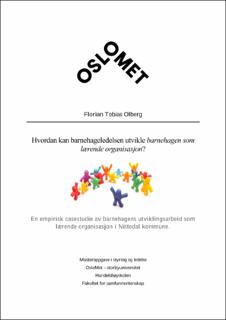| dc.description.abstract | A central requirement for the rammeplan for barnehagen stipulates that kindergartens in Norway are to develop as a learning organization. No further details are provided in the government’s guidelines as to what this means in practice. I have therefore chosen to describe kindergartens as learning organizations using Senge`s theory of the five factors and subsequently examine how kindergarten leadership can promote learning development for kindergartens according to these.
I chose Nittedal’s kindergartens for the case study as they from 2019 have been operating according to their own quality plan with the achievement goal of kindergarten as a learning organization and have gathered valuable experience with this mode of development. I conducted six semistructured interviews with kindergarten leaders in Nittedal and analyzed their experience-based knowledge. I add to and interpret the findings aided by other scientific research results and relevant documents.
By analyzing those interviews, I was able to extract an overview of both enhancing and inhibiting factors for this learning development effort. In addition, I relayed empirical results from Nittedal’s kindergartens to a broader kindergarten context and established my five conclusions which can be identified with Senge’s five factors. In my summary I propose that the kindergarten leadership must make a systematic and holistic effort with all five factors so that the kindergartens may develop in a learning mode at all levels. My five conclusions are as follows:
1. The kindergarten must have a practice-oriented approach which strengthens individual development from the lowest level and upwards in the system, so that it leads to personal mastery.
2. The kindergarten leadership ought to implement achievement-oriented leadership style when working with the kindergarten’s mental models by delegating responsibility, encouraging codetermination, including new staff and working methodically with its own attitude efforts.
3. The kindergarten leadership ought to merge and prioritize the kindergarten’s professional requirements and establish a simple and easily understandable practice-oriented system for reflection and development. This is to be conveyed by an uncomplicated shared vision.
4. Upgrading both individual and collective competence is important for team learning. Additional training on the individual level is especially crucial as well as day to day sharing of collective competence by employing sound reflective processes in the kindergarten.
5. There is a need for systematic, structured, and collective development work in conjunction with other kindergartens in order to further a culture of wonderment, sharing of competence and hence the systems thinking by the staff.
Kindergartens ought to develop an adaptive kindergarten culture with sound processes for reflection, continually setting new challenges and gain mastering experiences by learning and continuous evolvement. | en_US |
